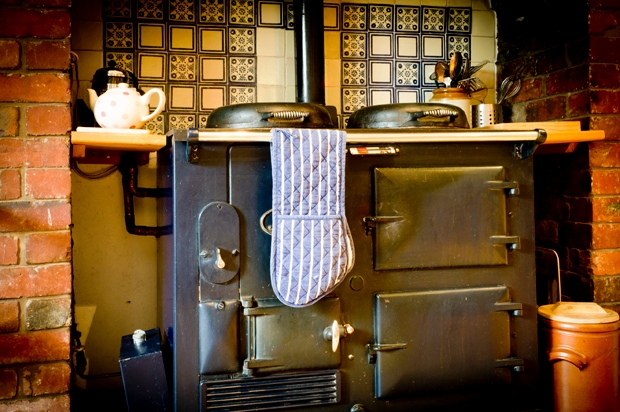Earlier this year my partner paid several hundred thousand pounds for an Aga. There’s no other way of putting it. A major cause of her excitement about our new house was the presence in its kitchen of the whacking great oven. I, on the other hand, was unsure how I felt about it — Aga-nostic, if you like. Six months later I’m sick of the bloody thing. What’s more, I’ve worked out why Aga lovers go on about them so much.
For those of you fortunate enough never to have encountered one of these beasts, the facts are these. An Aga has to be kept on constantly, sapping your fuel source (ours is electric) 24 hours a day. My model has two ovens, one at a fixed high temperature, the other at a fixed low temperature. There are two hotplates, ditto. And that’s it. No grill. No capacity for turning something down to a precise simmer: you can either watch your pasta boil dry in two minutes flat or come back for it tomorrow. No room on a hotplate for more than one saucepan at a time, so tough luck if your recipe needs more. Not an awful lot of room in either oven — if you had more than a few people round at Christmas, the turkey wouldn’t be the only thing that was stuffed.
Also, an Aga chucks out heat around the clock. ‘Isn’t it lovely in winter?’ coo the admirers. Possibly, though for what it costs you might as well have a brazier in the kitchen into which you throw £10 notes. And the flip side is that it’s a nightmare in summer. For the past few weeks we’ve had a sauna rather than a kitchen. At least I’m not my friend David, renting a house whose oil-fired Aga also controls the hot-water system. If he has a bath in the afternoon, dinner takes half an hour longer to cook.
The real clue to the uselessness of Agas comes when I mention these failings to a devotee. They never engage with my points directly — they can’t — but instead start banging on about Aga toast or Aga pancakes, done on the hotplate. Their awestruck tones are reminiscent of late-1960s hippies recommending a new strain of acid: the actual results are more mundane. Or the devotee will talk about how great an Aga looks, how it’s a real ‘presence’ in the kitchen, how it ‘makes a home a home’. They will then, a few sentences later, admit to having a normal cooker as well. ‘Yeah, we really love our car with no wheels,’ they might as well be saying. ‘Obviously we’ve got a normal car as well, for when we actually have to drive anywhere. But our car with no wheels has such character.’
So why, when they have literally no case to make, do Aga owners go on about how brilliant their oven is? I’ve realised that it’s because they have no case to make. These things cost serious money: apparently ours was £8,000, not including installation. And once you’ve stumped up that sort of dosh, you’re not going to admit it was a mistake. Aga owners are like those telephone scam victims you read about, life savings blown but refusing to believe they’ve been done. It’s not me they’re trying to convince about their Aga — it’s themselves.
But what persuaded them to part with their hard-earned in the first place? The desire to go back in time, that’s what. To own a bit of Britain’s heritage, return to a golden age when every kitchen contained a lovely old woman who looked uncannily like Mary Berry. (Berry herself must have done wonders for Aga sales, just as Joanna Trollope did 20 years ago. Though you’ll notice the Bake Off ovens are modern ones.) Well, yes, many decades ago there was a woman in every kitchen cooking nonstop from dawn till dusk. So an oven you didn’t turn off made sense. But lifestyles have changed — and even if they hadn’t, that woman would still have bitten your hand off for an oven you could control precisely. And indeed turn off between dusk and dawn.
So don’t fall for the Aga. Get yourself a modern electric oven with a gas hob on top. That’s what I’m buying with the money I’ll make from flogging our Aga. Even my partner has come round to the decision. The clinching factor was the latest electricity bill. She had the common decency to blanch when that arrived. In as much as you can turn pale standing next to a boiling-hot slab of metal and stone.
The Spectator Podcast: Listen to Mark Mason discuss Agas with Camilla Swift





Comments